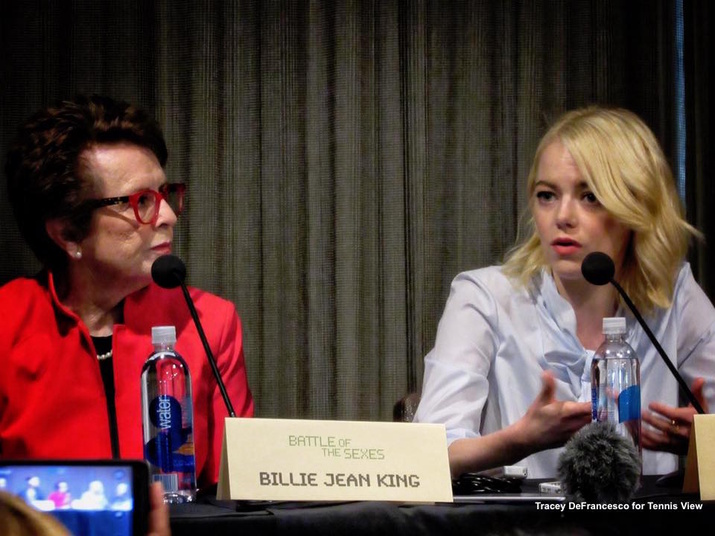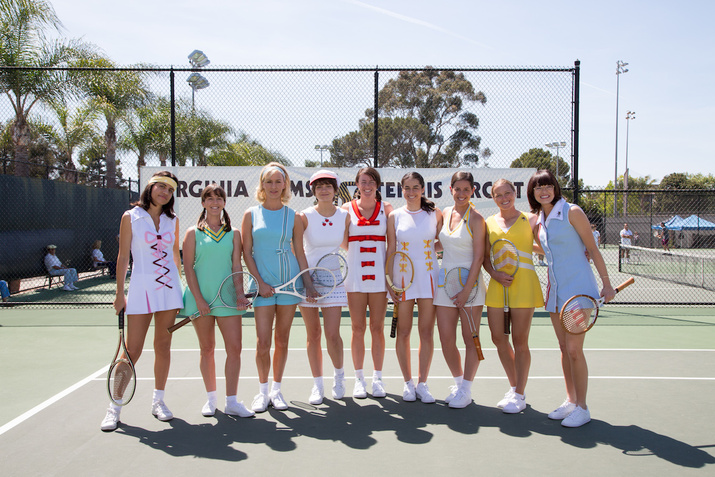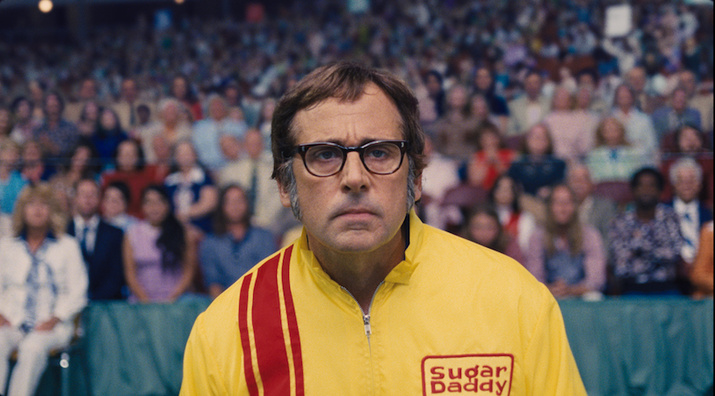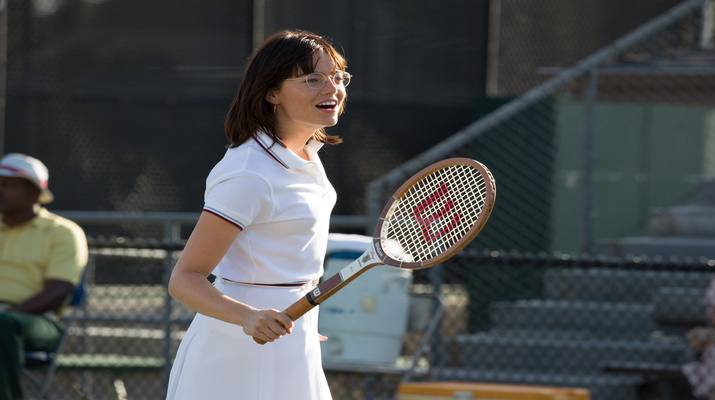Don't miss any stories → Follow Tennis View
FollowFilm Review: Battle Of The Sexes
Battle of the Sexes, in theaters this week, puts its money where its mouth is in more ways than one. To begin with, 21st Century Fox announced that for every ticket sold opening weekend, 79 cents will be donated to the Women’s Sports Foundation, an educational nonprofit founded by Billie Jean King. Why 79 cents? Because that’s the commonly cited number for what women on average make for every one dollar earned by men. Second, Emma Stone has stated that she and co-star Steve Carell were paid equally for the film. And finally, husband and wife directing team Jonathan Dayton and Valerie Faris opted to forgo alphabetizing and put Faris’s name first in the credits, a move she attributes to her spouse. “This felt like the right time to remind everyone it’s a team,” Dayton told the press.

Battle of the Sexes obviously tells the tale of how 29-year-old Billie Jean King came to face 55-year-old Bobby Riggs in a highly publicized match at the Houston Astrodome in 1973, but the film is so much more than the sum of the points played on the tennis court. The first half focuses more on Billie Jean’s burgeoning awareness of her sexuality and her fight for equal pay for female players, before turning to the main event. In doing so, the movie earns the emotional payoff of watching a match whose result is well-known; the audience is invested because we understand why the outcome matters.
Billie Jean King has spoken about how meaningful it is to her that the film features the Original Nine, a group of women who put their livelihoods on the line to pave the way for the formation of the Women’s Tennis Association (WTA). Scene-stealing Sarah Silverman portrays Gladys Heldman, who played a pivotal role in the creation of the women’s tour, with gusto. The story of these brave women and Billie Jean’s growing romance with her hairdresser is interspersed with scenes showing a smoldering Bobby Riggs, a man whose glory days are well behind him. Frustrated by his wife’s insistence that he take a 9 to 5 job and give up his beloved gambling habit, Bobby is a perpetual hustler looking for the next big score.

Despite Riggs’ reputation for chauvinism, Steve Carell plays him more like a loveable goof – a choice he made consciously. “He created a character. I think he saw what was happening in the zeitgeist and decided to try to profit it from it,” Carell says. “You could tell that all of these things he was espousing weren’t connected to his heart and I think that was part of his charm. I was 11 at the time, I knew it was a put on and most people knew.” In the movie, Bobby’s promise to “put the show back in chauvinism” doesn’t come until Billie Jean finally feels compelled to agree to play Bobby following Aussie champ Margaret Court’s humiliating loss to the grifter. “Even within all of that bravado and that crazy, over-the-top nature of his, you could see this pain that he was suffering through,” Carell explains.
So while the film is about the conflict between Billie Jean and Bobby, Steve Carell’s character is not actually the bad guy. “We made an effort not to really have clear bad guys,” says co-director Johnathan Dayton. “Even Bill [Pullman] in his rhetoric is a dimensional person who deserves respect.” Despite that stated intention, Pullman’s Jack Kramer and Margaret Court (played by Jessica McNamee) are portrayed as the villains in Billy Jean’s story.

One of the most sympathetic characters is Larry King, Billie Jean’s husband from 1965 to 1987 (we’re not talking about CNN’s Larry King here, just to be clear). In the short time period depicted in the film, he becomes aware of his wife’s affair with Marilyn Barnett, but stands by her side. Even now, Billie Jean is quick to tell the press about his role in moving women’s tennis forward. “Larry and I always talked about changing the tennis world since the 60s,” she says. “So he and I were in it together. There’s a scene in the movie where we’re forming the WTA and Larry has papers sitting on the desk – those are the bylaws, he was a lawyer and he was able to get the bylaws ready so we could elect the officers and actually have an association when we met and that made a huge difference.”
Although the movie shows that people around Billie Jean were aware of her homosexuality, she recently told Out magazine that she was publicly outed in 1981, well after the Battle of the Sexes match: “It was devastating. I had to start my life over. I lost endorsements. I lost everything, basically, overnight.” In the film, Emma Stone brilliantly balances the fear Billie Jean felt over being found out with the immense pressure she carried in her fight for equality. At the same time that King was dealing with big social issues, she was earning her living as a professional athlete at the top of her sport, trying to overcome the off-court distractions competing for her attention when she needed to be focused on hitting the ball over the net and inside the lines.

Stone readily admits that she came into the role with no athletic ability. “I had never played tennis, I’m not particularly good at tennis,” she admits. “It was a big hurdle but we were able very early on to realize where my strengths would be.” She credits the tennis realism to her tennis double, Kaitlyn Christian, her coach, former ATP pro Vince Spadea, and a trainer who helped her bulk up with 15 pounds of muscle. Even though she may not have mastered playing with a wooden racket, Stone says working out for the film did offer her a new perspective: “Billie Jean is a social activist, she was always wired for social change. She realized that at the very beginning but she also realized she was great at tennis and this would be an amazing platform for her to change the world. Physicality has everything to do with that. If you have the strength to be the best in tennis, you can change the world. That was an amazing place to get to, to understand that physical strength equals strength out in the conversation to further equality.”
The film carries a sense of empowerment throughout, culminating in the title match that delivers on the intensity promised in its build up. Audiences may walk out of the theater with a motivation to enact positive change in the world, or at least be more aware of the battles previously fought in the ongoing war for equality. If nothing else, they’ll likely be inspired to dust off their rackets and play some tennis.
photo credits: Stills from the film courtesy of 21st Century Fox, photo of Billie Jean King and Emma Stone courtesy of Tracey DeFrancesco










